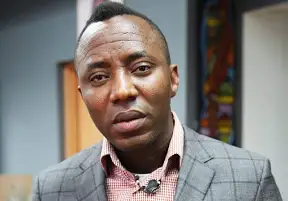
#REVOLUTIONOW: HOW WE FOILED DICTATOR ABACHA’S PLANS IN 1998 – SOWORE
Omoyele Sowore, the convener of the #RevolutionNow movement, has pledged to continue the fight for revolutionary change and the ousting of ineffective leaders in Nigeria.
In a post on his X account on Friday, the human rights activist reminisced about a pivotal moment in 1998 when he, along with fellow activistst Sylvester Odion Akhaine and Ogaga Ifowodo, successfully resisted former military head of state Sani Abacha’s attempt to install himself as the sole candidate in his proposed transition programme.
Despite being met with a formidable force of over 5,000 police and soldiers, the activists remained resolute and ultimately thwarted Abacha’s plans.
Sowore drew inspiration from this historic event as he vowed to sustain the current protest and quest for leadership change in Nigeria.
He said, “In 1998, so many youths and elders in Nigeria were handsomely paid to support the late General Abacha’s quest to become the sole candidate in his planned transition programme, so in April, we embarked on a counter-protest in Lagos tagged “Abacha Must Go”. It was an unexpected success.
“So in May, when word came that Alhaji Lamido Adedibu was planning an Abacha rally at Adamasingba stadium in Ibadan, Oyo, we mobilized down there.
“The Nigeria Police mobilized over 5,000 police, and the Nigerian Army also sent reinforcements; as determined freedom fighters, we mobilized from different parts, snuck into Ibadan the night before, and camped out at Dr Ola Onu’s bungalow to thwart the Abacha campaigner’s rally.
“When we started heading towards the stadium, we were met with some cane-bearing Masquerades assembled by Adedibu and his supporters.
“We pushed them aside, giving the people of Oyo state the courage and energy to rain on their parade.”
Sowore said it took the help of AIT crew to help Adedibu escape the people’s wrath once the people surrounded the stadium.
“The 5,000 police plus soldiers ran away. Of course, the brutal dictator Sani Abacha died a few weeks later.
“The leaders here in the photo are Sylvester Odion Akhaine, Ogaga Ifowodo and my angry self!” he said.
Sowore had previously declared that a protest would be held on August 5 to commemorate the movement’s fifth anniversary.
However, he revealed that President Bola Tinubu has counter-mobilised, planning a rival protest to oppose the #RevolutionNow movement. Furthermore, Sowore exposed that President Tinubu has established a media centre in Abuja to amplify his counter-revolutionary efforts, which are slated to take place in August 2024.
But he said, “Have no fear for the Nigeria Police Force, HQ Nigerian Army or the Department of state security service because none of them can stop the time.”
According to Sowore, although Nigerians may not have been prepared for revolution in 2011 and 2014, when Tinubu and Muhammadu Buhari respectively advocated for it, the situation has now changed.
Sowore believes that Nigerians are currently eager for a genuine revolution, and ironically, the present administration’s actions will ultimately precipitate this revolution.In other words, the government’s policies and actions will inadvertently spark the very revolution that Nigerians are now ready to embrace.
 Premium News
Premium News